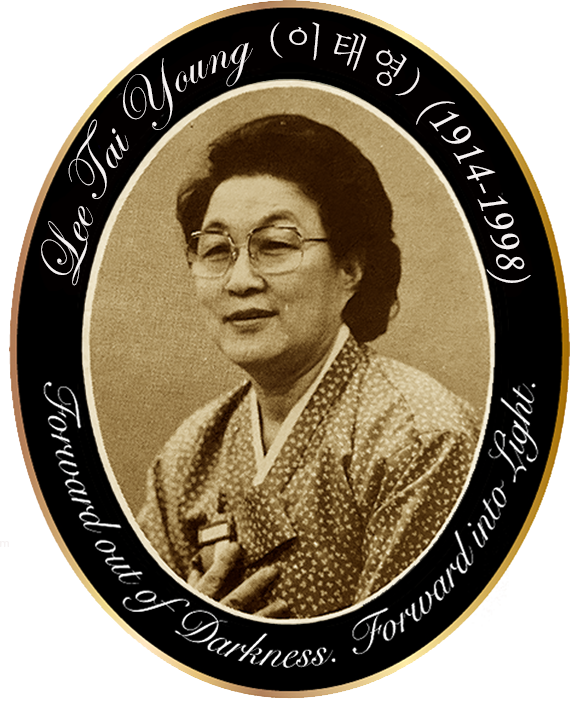Lee Tai Young (1914-1998)
When I started, I wasn't able, but in trying, I became able.

Lee Tai-young (이태영) (1914-1998) was a social activist and the first ever female lawyer in Korea. She was involved in pro-independence, human rights, and Korean democracy movements. She is also the founder of Korea Legal Aid Center for Family Relations. Because of her numerous accomplishments, she is recognized as one of the most prominent women figures in modern Korean history.
She was born in 1914 and raised in a methodist family in Unsan, North Korea. Her mother equally distributed educational attainment opportunities along with her male siblings thus Lee Tai Young was able to receive proper education as a woman. After graduating from Ewha Women's University in 1932, she married Jeong Il-hyung (정일형) in 1936 who she got to know through Dosan Ahn Chang-ho. (도산 안창호). Jeong Il-hyung was an educator and actively involved in the Korean independence movement. As discussed below, he was one of the signers of the 3.1.1976 Declaration, which is among our Documents of Virtue.
While she was an ordinary traditional Korean housewife who devoted raising her four children and needleworking for pay, Lee Tai-young was thinking about pursuing a law degree, which was an unusual career pursuit for a Korean woman in the 1940's. However, Jeong Il-hyung supported Lee Tai-young in her dream and she eventually studied law at Seoul National University (SNU). She graduated SNU with a law degree in 1949. However, her goal to become a lawyer had to be pushed away due to the Korean war in 1950. She had to flee to Busan with her family and live there as a refugee. "Where there’s a will, there’s a way". She reminded herself with this phrase during her deteriorated refugee period. After she passed the National Judicial Examination in 1952, she became the first woman to ever pass the National Judicial Examination, making her the first Korean female law practitioner in history. She was appointed to become the first female judge, but her husband's political activity of being the opposite party to president Lee Syng-man led to her career as a lawyer.
She opened her own law firm in 1952 and focused on legal service for domestic cases. Through this experience, she recognized that the domestic law system in Korea needs significant renovation and women's rights improvement. She organized The Women’s Legal Counseling Center in 1956 to focus on modernizing outmoded domestic laws such as the abolishment of the system on the head of family and the approval of the same surname, same place of family origin to get married. Her ideas of overthrowing unequal rights between men and women in Korea got criticized by neo-confucianists that she is trying to destroy the traditional rule of men and women. Later, the Women's Legal Counseling Center became the foundation of Korea Legal Aid Center for Family Relations in 1966. "The foundation of Korea Legal Aid Center for Family Relations is fundamentally based on the idea that every human-being is equal and deserves to have an equal right" She quoted during her speech at the 30th anniversary of Korea Legal Aid Center for Family Relations in 1986.
She gave the opening speech at the International Bar Association in Monte Carlo 1972 as the first female lawyer. "I always had a feeling that for the last 5000 years, Women have been waiting for female lawyers who could listen to their stories and get help from. It is a shame that women have been treated unfairly under the law system for so long instead of getting proper protection for their rights".
Under the regime of President Park Chung-hee's military dictatorship in the 1970's, Lee Tai-young participated in "Documents of Virtue" in 1974 and assisted her husband in forming "The 1976 declaration". This declaration is called the opposite of October restoration: the return of liberties to the citizens. Park Chung-hee regarded it as treason. Although she didn’t sign the declaration, because of her political views against military dictatorship, Lee Tai-young was arrested and lost her license to practice as a lawyer in 1977, while her husband had to give up his political career as a senator. She rather focused herself on the women's rights movement until she was reinstated to practice law in 1980.
Lee Tai-young was one of the main supporters of Korean politician and activist Kim Dae-jung. She advocated Kim Dae-jung whenever he suffered from political hardships and mentored his democratic and political activities. When Kim Dae-jung was accused of treason in 1980, she advocated for his innocence and exclaimed to a military prosecution officer. "If you have a bad eyesight that can't see the people straight through, put your glasses on and see straight through. Think about what you're doing right now. Aren't you ashamed of yourself in front of your children?"
In her later years, she noted during an interview. "When I started, I wasn't able, but in trying, I became able. If I'm an influential person, that must be freeing Korean women from outmoded evil domestic laws. The revision of Korean domestic laws is in my history of legislation and that is my fate and my duty. Because equity and justice accomplices start from resolving women's rights".



